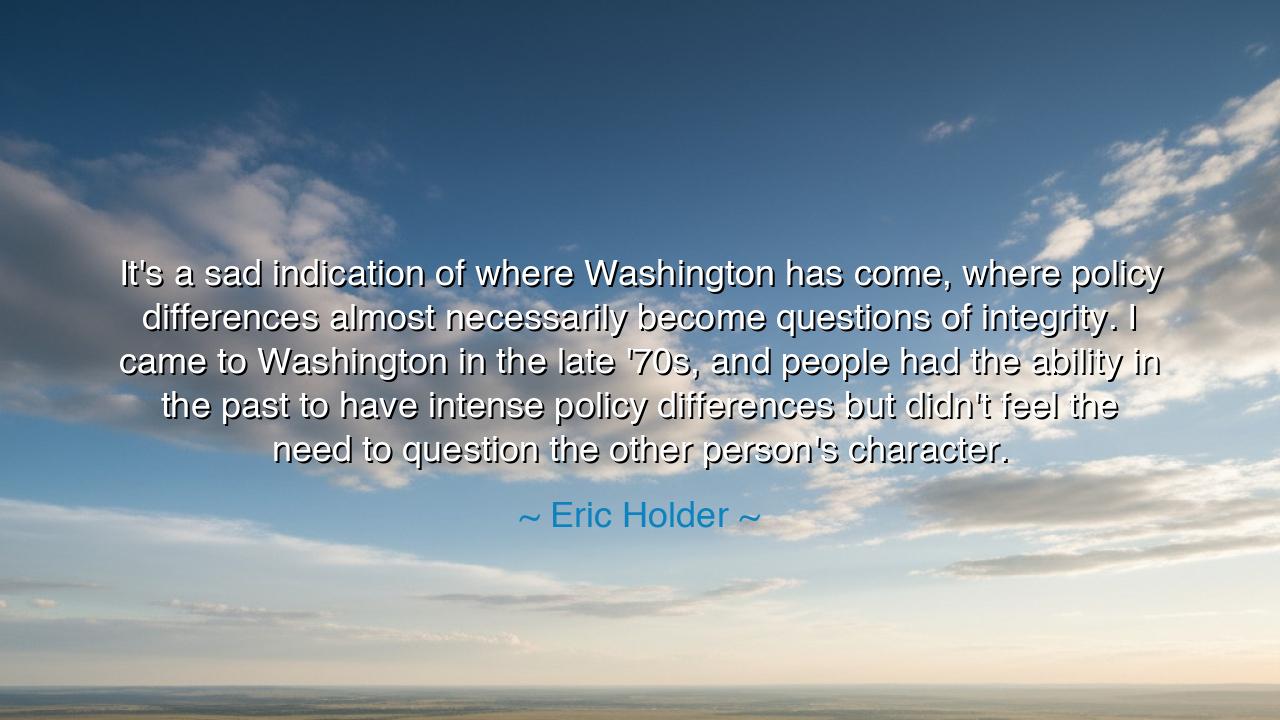
It's a sad indication of where Washington has come, where policy
It's a sad indication of where Washington has come, where policy differences almost necessarily become questions of integrity. I came to Washington in the late '70s, and people had the ability in the past to have intense policy differences but didn't feel the need to question the other person's character.






The words of Eric Holder, “It’s a sad indication of where Washington has come, where policy differences almost necessarily become questions of integrity,” carry the mournful weight of a man who has seen the spirit of governance descend from noble debate to poisonous suspicion. Holder, a former U.S. Attorney General and servant of public law, speaks as one who has walked the marble halls of power and witnessed the corrosion of civility, the decay of mutual respect that once bound adversaries to a shared love of country. His lament is not for politics alone, but for the soul of discourse itself—for the loss of an age when men and women could disagree fiercely, yet still clasp hands in the common service of truth.
In the ancient world, the philosophers of Greece and the senators of Rome were trained not only to argue, but to honor the argument. They believed that reason thrives in tension, that the contest of ideas is the forge of wisdom. Yet they also understood that the enemy of thought is contempt. When disagreement becomes personal, when we no longer seek to defeat an idea but to destroy a person, the light of reason flickers and dies. Holder’s sorrow springs from this recognition: that in the modern age, the art of disagreement has been replaced by the warfare of accusation, and politics has become a theater of moral distrust rather than intellectual courage.
To understand his meaning, one must remember that Holder entered public life in the late 1970s, when leaders across party lines still found ways to collaborate even through ideological storms. Tip O’Neill and Ronald Reagan, for example, were fierce opponents—one a liberal Democrat, the other a conservative Republican—but after their battles in the public square, they shared drinks and laughter in private, bound by a mutual understanding that their conflict served the people, not their pride. That generation of leaders, though imperfect, believed in the dignity of disagreement. Their debates sharpened the nation’s vision without wounding its heart.
But as decades passed, the age of dialogue gave way to the age of division. The rise of twenty-four-hour media, the echo chambers of partisanship, and the hunger for scandal turned discourse into spectacle. Each side began to see the other not as mistaken, but as malicious. To hold a different opinion became evidence of corruption; to question policy became to question character. This, Holder calls a sad indication, for it reflects a nation losing the ability to separate moral worth from political stance—a loss that weakens both democracy and the human spirit.
Consider the story of Abraham Lincoln, who during the crucible of the Civil War surrounded himself not with loyalists, but with his rivals—men who had opposed him bitterly for the presidency. He called them his “Team of Rivals.” Lincoln understood that greatness arises not from comfort, but from the collision of convictions. Though they clashed, he never questioned their integrity, for he knew that unity is born not of sameness, but of shared sincerity. It was through that humility and courage that he guided a fractured nation toward freedom. How far we have drifted from such wisdom, when even a whisper of dissent now earns the venom of hatred.
Holder’s words thus ring as both an elegy and a warning. A democracy that cannot tolerate disagreement becomes a tyranny of self-righteousness. When every debate descends into insult, when every opponent becomes an enemy, the pillars of liberty crumble—not from external assault, but from internal decay. True integrity does not lie in demanding moral perfection from others, but in guarding one’s own honor amid conflict. To mistake opposition for evil is to close the gates of understanding and to banish the very spirit of democracy itself.
Therefore, let this teaching be passed on to the generations that follow: argue with courage, but listen with grace. Hold fast to your convictions, yet never forget that those who stand against you may still love the same good, though they see it through a different lens. The purpose of debate is not to destroy, but to discern—to seek a greater truth that neither side alone can grasp. In every era, there will be division; but the true statesman, the true citizen, builds bridges across it. For as Holder reminds us, the test of integrity is not how fiercely we fight for our beliefs, but how humanely we treat those who do not share them.






AAdministratorAdministrator
Welcome, honored guests. Please leave a comment, we will respond soon